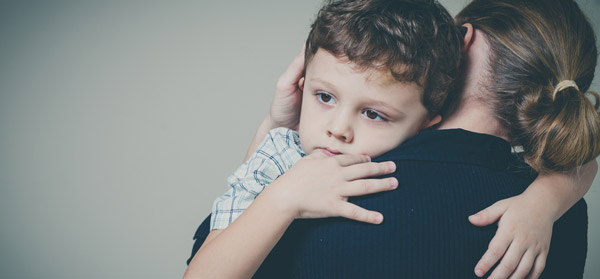When someone dies the initial reaction is often to protect the children who were close to them by trying to hide the truth. However, it’s worth bearing in mind that if someone is old enough to love then they are old enough to grieve and this grief needs to be acknowledged.
It’s recognised that children as young as two or three can sense a death in the family. It’s usually a change of routine, more people than usual being in their home and of course, the sadness experienced by those around them – children are often more intuitive than we give them credit.
As it’s already most likely a time of great confusion in their lives, speaking to a child about death should be kept as simple as possible, without being too blunt. As a parent, grandparent, aunt or uncle, you will probably be a fair judge of the child’s understanding of language and his or her ability to comprehend what is being said. Children should also be allowed to talk about the person who has died, as this can be a way of managing emotions and acknowledging memories. On the other hand, should a child not wish to talk about that person, then this should also be respected.
It used to be that children were excluded from attending the funeral of family members who had died, but as is now widely recognised, a funeral is an important part of the grieving process. If the child can participate in the farewell, that should also be encouraged. It may be choosing a favourite photo or poem that can be included in the order of service, or if the child is a little older, they may be able to give a reading.
Children will also ask questions about death and it’s important to answer these honestly, but with kindness. It’s vital that children understand that death is final and it’s not the same as going to sleep, but also that even though someone is not in their lives any more, they can still have their treasured memories.
Allowing a child to express their emotions, whether it’s tears, anger or uncertainty is a natural part of the grieving process – just as it is with adults. Comments such as ‘be brave’ and ‘big boys/girls don’t cry’ are not helpful. Also, children may express their grief through actions that they may have previously grown out of – bed wetting, thumb sucking, clinginess and outbursts of unexplained anger. These shouldn’t be ignored or chastised but recognised for what they are.
As with every individual, regardless of age, the grieving process is different. But if you know what to expect, then you should be able to better support your young relative through this difficult time. Bereaved children also have much the same needs as adults, as this handy factsheet from MyGriefAssist highlights.
If you find yourself in the position of having to talk to a child about a death, consider these points:
- Be direct, use simple language and tell the truth.
- Children will be familiar with words such as ‘death’ and ‘died’, so use them – phrases, such as ‘passed away’ may only confuse them.
- For young children, using picture books and prompts may make it easier for them to understand. Shine by Trace Balla is a good example.
- It’s not a one-way conversation. Encourage children to explain what they make of the situation and how they think it will affect them.
- Don’t shoot down any questions – children are naturally curious and often not confined by the usual social conventions, so be prepared to answer any and all.
- It’s OK to show your emotions in front of the child but if you’re simply too distressed, it may be better to have another adult explain. It’s important that a child feels as though the situation is under control.
White Lady Funerals understands how loss and grief can impact on children and that it takes special care and compassion to help them through a difficult and often confusing time. The dedicated team of women brings a thoughtful and gentle touch to help families ensure that the funeral is a beautiful reflection and farewell to their loved one.

